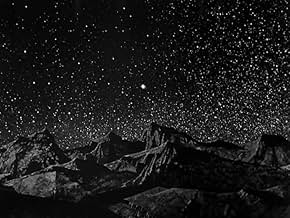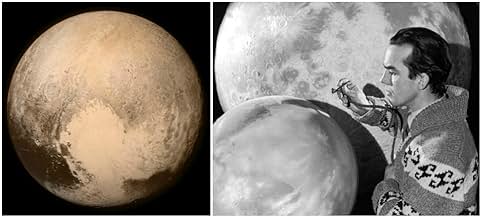Ajouter une intrigue dans votre langueA journey through the universe as it would appear to a space traveler beginning at the David Dunlap Observatory on Earth.A journey through the universe as it would appear to a space traveler beginning at the David Dunlap Observatory on Earth.A journey through the universe as it would appear to a space traveler beginning at the David Dunlap Observatory on Earth.
- Réalisation
- Scénario
- Casting principal
- Nommé pour 1 Oscar
- 2 victoires et 1 nomination au total
Douglas Rain
- Narrator
- (voix)
- (non crédité)
Avis à la une
As I watched this, I worked on the assumption that while I don't remember it I'm convinced that I've probably seen it before - as a child in school in the early 1970's. It's a production of the National Film Board of Canada, and NFB films were a staple in classrooms at the time. It's quite short (27 minutes) and it's very hard to rate. One has to try to remember that it was made in 1960. More than 50 years later we know a lot more about the universe than we did then. So perhaps it's unfair to become overly concerned with some of the scientific errors that are made, but having said that - they do stand out to the modern viewer. Things like, "Mars almost certainly has vegetation," or "Venus may have either dense clouds - or dust storms," or "Jupiter has 12 moons." Those things tempt the viewer to simply declare this hopelessly dated and out of touch with modern knowledge. The absence of any commentary about either Uranus or Neptune during the tour of the planets perhaps suggests that not enough was known about Uranus or Neptune in 1960 to even make inaccurate statements. (On the other hand, Pluto is referred to as a "dwarf" - 46 years before the International Astronomical Union got around to downgrading it! You have to give the NFB some credit for its prophetic abilities!) So, as an aid in classrooms studying astronomy, this wouldn't be useful today.
Still, you have to also look at its technical merit and at its message. It makes great and haunting points about the vastness of both space and time - the unimaginableness of such things on a cosmic perspective. That reflection succeeds in putting our little life here on this little planet revolving around this little sun in this one galaxy among countless galaxies into perspective. The closing words, speculating about how many civilizations in the vastness of the universe have risen and fallen reminds us of how temporary are the things that we think of as so important. So if now rendered scientifically inaccurate, it is nevertheless still thought-provoking.
I was somewhat surprised to discover that this film inspired Stanley Kubrick as he worked on "2001: A Space Odyssey." It's therefore made a lasting contribution to the genre of science fiction - although science fiction was certainly not what the NFB was going for.
The narration in this could have perhaps been a bit more dramatic; a bit more exciting - although it's pretty typical for what I can remember of NFB films. They didn't go for excitement or drama; they dealt with their subject matters in very formal and official sounding tones. So while I may think this would have benefited from a lively narrator, this was undoubtedly what the NFB was going for.
While I admire its technical merits, and the lasting impact that it had, I can't get over the fact that, based on the purpose for which it would originally have been made, it's now rather useless. So it only gets a 6/10 - but it's nevertheless well worth watching.
Still, you have to also look at its technical merit and at its message. It makes great and haunting points about the vastness of both space and time - the unimaginableness of such things on a cosmic perspective. That reflection succeeds in putting our little life here on this little planet revolving around this little sun in this one galaxy among countless galaxies into perspective. The closing words, speculating about how many civilizations in the vastness of the universe have risen and fallen reminds us of how temporary are the things that we think of as so important. So if now rendered scientifically inaccurate, it is nevertheless still thought-provoking.
I was somewhat surprised to discover that this film inspired Stanley Kubrick as he worked on "2001: A Space Odyssey." It's therefore made a lasting contribution to the genre of science fiction - although science fiction was certainly not what the NFB was going for.
The narration in this could have perhaps been a bit more dramatic; a bit more exciting - although it's pretty typical for what I can remember of NFB films. They didn't go for excitement or drama; they dealt with their subject matters in very formal and official sounding tones. So while I may think this would have benefited from a lively narrator, this was undoubtedly what the NFB was going for.
While I admire its technical merits, and the lasting impact that it had, I can't get over the fact that, based on the purpose for which it would originally have been made, it's now rather useless. So it only gets a 6/10 - but it's nevertheless well worth watching.
This short, done under the auspices of the National Film Board of Canada, holds up quite well in an area that can date in an instant. The animation effects are exceptional and my only real problem was with the narrator who came perilously close to becoming a cure for insomnia. Very well done, it was nominated for an Oscar for Documentary Short. Recommended, with the caveat that later information renders some of this less useful on technical points.
It never ceases to amaze me what men in the obligatory white coats can deduce from a still, monochrome, photograph taken of an object at least 200 million miles away!. Their spectrographic analysis can tell us the make up of everything from the rings of Saturn to the million miles long tail of a racing comet. The scientists in question are based at the David Dunlap Observatory in Ontario and for half an hour they regale us with images both real and speculative of our solar system, of the wider universe, stars, nova, super nova - you name it. The visual effects could easily be the inspiration for the titles on the original "Star trek" series as we are given a sensation of moving through space encountering a myriad of objects en route. Knowing now what we didn't then does enable us to poke some fun at the concept of Martian broccoli or the twelve moons of Jupiter (is has dozens and dozens) but that would not be fair on people who made some surprisingly intelligent guesses and drew some spectacularly accurate conclusions from within the limitations of their contemporary technology. The narration is a little pedestrian, but by the end I thought it would be fascinating to see how the skills of these astronomers could capitalise on today's technology. They didn't do so badly fifty-odd years ago and this is an interesting documentary to watch.
Award-winning Canadian documentary that transports the viewer through space from the Sun and the inner planets of the solar system to the black emptiness of the intergalactic void. The imagery is striking and Douglas Rain's narration is interesting and evocative (sadly, the statement that the transient dark patches on Mars were vegetation turned out not to be the case). The film is framed with scenes of University of Toronto astronomer Dr. Donald MacRae preparing the 74" reflector telescope at The David Dunlap Observatory for a night of star photography and watching him manually set up and calibrate the massive pre-computer instrument is fascinating. 'Universe' may be best known as one of the inspirations for Stanley Kubrick's '2001 A Space Odyssey' (1968). Kubrick was so impressed that he recruited some of the production crew for his epic space opus and chose Rain to be the iconic voice of the renegade HAL9000 computer. Needless to say, the film's imagery cannot be compared with contemporary CGI space-art but if watched with 1960's eyes 'Universe' is an outstanding trip into the beyond.
10Paul-412
Universe, a short film made by the infamous B-unit of the Canadian National Film Board in 1960, is one of the best films ever made and one of my favourites. This (under 30 minute) film inspired Kubrick's "2001: A Space Oddyssey", which itself inspired Lucas' "Star Wars", which itself inspired all other science fiction. My earlier reference to the filmmakers (infamous B-unit) is in regards to a group of filmmakers who made a series of instructional documentaries for the Canadian film board. Upon deeper analysis of these films, and particularily Universe, one finds a hidden philosophy which can allude to the meaningless of life and a kind of anti-americanism which is at the core of all the B-unit films.
Universe itself is a breathtaking film with visuals as yet unmatched by today's expensive special effects. The effects in Universe make one feel small and insignificant as if our existence is arbitrary, unimportant, and even vulnerable. We're shown the Universe as a cold void which is indifferent to our cries of "What does it all mean?" However, for those not willing to give this film the analysis which it deserves, Universe can be enjoyed just on the visuals alone which can watched again and again. I've stopped short from giving a detailed description of the plot so that anyone reading this before seeing the film can simply sit down and let the film wash over you. Enjoy!
Universe itself is a breathtaking film with visuals as yet unmatched by today's expensive special effects. The effects in Universe make one feel small and insignificant as if our existence is arbitrary, unimportant, and even vulnerable. We're shown the Universe as a cold void which is indifferent to our cries of "What does it all mean?" However, for those not willing to give this film the analysis which it deserves, Universe can be enjoyed just on the visuals alone which can watched again and again. I've stopped short from giving a detailed description of the plot so that anyone reading this before seeing the film can simply sit down and let the film wash over you. Enjoy!
Le saviez-vous
- Anecdotes'Stanley Kubrick' viewed this film and was used as a template for the special effect shots used in his 2001 : L'Odyssée de l'espace (1968). He used the same panning camera effect for creating his planets. He even hired narrator Douglas Rain to voice the computer HAL.
- ConnexionsEdited into 50 for 50: Volume 1, Tape 3: Animation: Reflections (1989)
Meilleurs choix
Connectez-vous pour évaluer et suivre la liste de favoris afin de recevoir des recommandations personnalisées
Détails
- Date de sortie
- Pays d’origine
- Langue
- Aussi connu sous le nom de
- Der Himmel über uns
- Lieux de tournage
- Sociétés de production
- Voir plus de crédits d'entreprise sur IMDbPro
- Durée29 minutes
- Couleur
- Mixage
- Rapport de forme
- 1.37 : 1
- 1.66 : 1
Contribuer à cette page
Suggérer une modification ou ajouter du contenu manquant


















